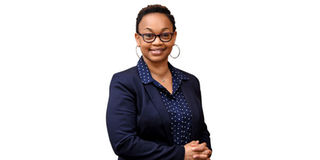If you are in a position of privilege, support a fellow woman- Candy Wekesa

Candy Wekesa Okoboi the head of the legal department at Stanbic Bank-Uganda and director on the board of the British American Tobacco (BAT). Photo Courtesy
What you need to know:
Candy Wekesa Okoboi is the head of the legal department at Stanbic Bank-Uganda and director on the board of the British American Tobacco (BAT). She shares her thoughts on women equality.
August 26 is Women’s Equality Day. It is a day to celebrate the progress made by women and reflect on the hurdles they face in championing change, globally. Women face violence, discrimination, stereotypes, struggle for equal treatment in education and employment spaces.
Although it has its origin in the US, where women were given a right to vote and be part of the decision-making in 1920, Women’s Equality Day is celebrated globally to pay tribute to all women that are making a difference in society.
Today, higher institutions of learning are churning out more female graduates, the percentage of women in the workforce has tremendously increased and more than ever before, women are now primary bread winners. Women have taken up spaces in the military, business, medical world, engineering and law among other professions.
Women’s Equality Day reminds us we all have the opportunity—and the responsibility—to create a society that gives both men and women equal voice and equal opportunity.
Is Uganda making progress as far as women equality is concerned?
Uganda is a flagship case in the region that has demonstrated the support for women professionals for a long time. We were the first country to have a female vice president in the region and in the political landscape, women are well represented. But a lot needs to be done, especially now that many women are sexually harassed and many teenage pregnancies have been registered due to Covid-19. With education put on hold, even over and above the delays that have been caused by the closure of schools, the boy child will emerge out of this with his opportunity still open. This will have a significant effect on the progress we have made so far. Today, we still celebrating pioneer women emerging in various fields, and we should. However, by now we should be past this initial milestone and go further to create a critical mass in these fields. Just as we are beneficiaries of the women who went before us, we also have a duty to open the path for the women behind us.
In what ways can women can agitate for equality?
Fortunately, we have a good representation of women in the public sector and in positions of authority who can influence the necessary policy shifts. One of the things that needs urgent attention is the fact that a girl has to drop out of school because she is bringing forth a life. Such girls need to be supported and skilled because they have a life that depends on them. One of the areas I am passionate about is the need for the girls to stay in school even after they have become mothers, especially out of duress. Secondly, we should embrace mentorship. Many women are reluctant to mentor their peers because they think they will outshine them and end up taking their positions. But this is self-defeating. We should all strive to uplift fellow women and create the necessary pipeline that will fill up available opportunities and trigger equality.
What gender equality progress have you witnessed in your line of work?
When I came out of law school, there were a few women in private practice and the general sentiment was that a female lawyer was not quite as suited as her male counterparts. The qualifications that you held did not necessarily make you a peer. I encountered clients who would ask to speak to a “real lawyer” because they thought I was either a clerk, a personal assistant or the person who took coffee orders! Obviously, it was draining and demotivating to have to continuously explain to clients that I am actually a lawyer. However, I engaged my male colleagues in the law firm to give me the benefit of an introduction that was necessary to make the clients entrust their matters to me. It took about three years to gain the profile of a qualified lawyer and along the way, there was a lot of tea-making and minute-taking. Today, the landscape of private practice is different. There are many female partners in chambers and there are many firms founded by female lawyers. This is progress and I have a strong conviction that this picture is replicated in other professions.
Women spend more time on the farm, till the land, produce food for the family and the nation, but when it comes to property ownership, men take it all. How do we change the status quo?
There is a deep-rooted cultural aspect to this issue and that is why the law on its own will not solve this matter. How do you change culture? I do not think there is one answer to it, but if we engage in open conversations and deliberately sensitise our society about this injustice and the economic disadvantages on women and by extension the nation, we can start to turn the dial.
How do we make equality a reality?
In addition to all the things we are doing, we need our male counterparts on board. That partnership is key because the idea is not to have a society dominated by women, but one that offers equal opportunities to all people.




